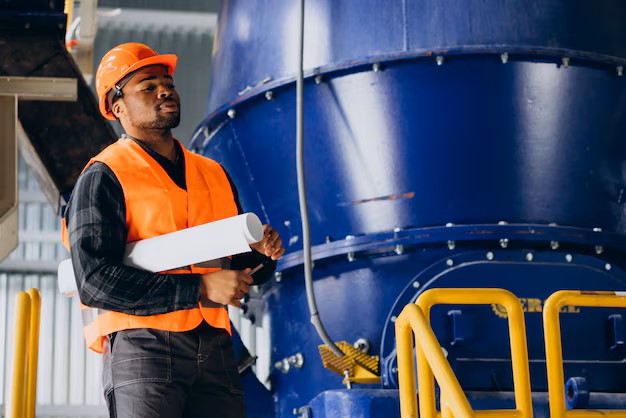LNG Facilities for Operations and Maintenance – OT-43 28th April – 2nd May 2025
- Description
- Reviews
Course Overview
This 5-day course is designed for professionals working in LNG facilities, focusing on the operational and maintenance aspects required for the effective and safe functioning of LNG plants. The course covers the entire lifecycle of LNG facilities, including construction, operation, and maintenance procedures. It provides in-depth knowledge of LNG processing systems, safety protocols, troubleshooting, and optimisation strategies essential for LNG plant performance. Participants will gain practical skills to manage day-to-day operations, ensure the reliability of plant systems, and handle critical maintenance tasks in LNG facilities.
Course Objectives
By the end of this course, participants will be able to:
-
Understand the operational and maintenance requirements of LNG facilities.
-
Identify key LNG plant equipment and their functions, including cryogenic systems and gas processing units.
-
Apply best practices for the safe and efficient operation of LNG facilities.
-
Conduct troubleshooting and resolve operational issues in LNG plants.
-
Implement preventive and corrective maintenance strategies to ensure plant reliability.
-
Comply with safety and regulatory standards applicable to LNG operations and maintenance.
Target Audience
-
LNG plant operators and engineers.
-
Maintenance personnel in LNG facilities.
-
Supervisors and managers in LNG operations.
-
Process and instrumentation engineers working in LNG plants.
-
Safety officers and compliance managers in LNG facilities.
-
Technicians and engineers aiming to enhance their understanding of LNG plant operations and maintenance.
Daily Agenda
Day One: Introduction to LNG Facilities Operations
-
Overview of LNG Facilities: Introduction to LNG plants, including their purpose, components, and key processes.
-
LNG Plant Operations: Key operational processes in LNG facilities, from gas conditioning to liquefaction and storage.
-
Plant Equipment Overview: Understanding critical equipment such as compressors, pumps, cryogenic exchangers, and storage tanks.
-
Control Systems in LNG Facilities: Overview of control systems used in LNG operations, including SCADA and DCS.
-
Safety and Regulations: Safety standards and regulatory requirements in LNG operations.
-
LNG Process Flow: Understanding the flow of natural gas through the LNG production system.
Day Two: LNG Processing Systems and Equipment
-
Gas Pre-Treatment and Conditioning: Methods for removing impurities from natural gas before liquefaction.
-
LNG Liquefaction Process: Detailed analysis of the liquefaction cycle, refrigeration, and cryogenic systems.
-
Heat Exchangers and Refrigeration Systems: Role of heat exchangers and refrigeration in LNG production.
-
Gas Turbines and Compressors: Operation and maintenance of gas turbines, compressors, and other key equipment in LNG facilities.
-
Piping and Valves: Critical components for LNG flow and pressure control.
-
Case Study: Equipment failure analysis and resolution strategies.
Day Three: LNG Storage and Transportation
-
LNG Storage Systems: Design and operation of LNG storage tanks, including safety and regulatory considerations.
-
Transport of LNG: Methods and equipment used for transporting LNG, including tankers and pipelines.
-
Safety in LNG Storage and Transport: Key safety measures and risk management strategies for LNG storage and transport.
-
Vapor Recovery Units: The role of vapor recovery units in controlling emissions during LNG storage and transport.
-
LNG Quality Control: Ensuring the quality of LNG during storage and transport.
-
Maintenance of LNG Storage and Transport Systems: Best practices for maintaining LNG storage tanks, piping, and transportation systems.
Day Four: Maintenance Strategies for LNG Facilities
-
Preventive Maintenance: Developing a preventive maintenance programme for LNG facilities to enhance plant reliability.
-
Corrective Maintenance: Approaches for resolving breakdowns and unplanned maintenance issues.
-
Predictive Maintenance: Introduction to predictive maintenance techniques, including condition monitoring and analysis.
-
Troubleshooting LNG Plant Operations: Identifying and troubleshooting common operational problems in LNG facilities.
-
Emergency Response: Developing and implementing emergency response plans for LNG facilities.
-
Hands-on Maintenance Exercise: Practical maintenance tasks and troubleshooting scenarios for LNG plant systems.
Day Five: Optimisation and Efficiency in LNG Facilities
-
Optimising LNG Plant Operations: Strategies for improving efficiency and reducing costs in LNG production.
-
Energy Efficiency in LNG Plants: Techniques for improving energy utilisation in LNG facilities, including heat integration and recovery.
-
Asset Management and Lifecycle Optimisation: Managing the lifecycle of LNG plant equipment to maximise performance and lifespan.
-
Continuous Improvement in LNG Operations: Implementing lean practices and continuous improvement strategies in LNG operations and maintenance.
-
Regulatory Compliance and Documentation: Ensuring compliance with safety, environmental, and operational regulations in LNG facilities.
-
Final Assessment: Review of key topics and practical applications, including a troubleshooting exercise and discussion on optimising LNG facility operations.
Why Choose this Course?
This course equips LNG plant professionals with the essential knowledge and practical skills required for efficient operations and maintenance. It covers a wide range of topics, from LNG processing systems to troubleshooting, maintenance strategies, and plant optimisation. By focusing on real-world applications, this course ensures that participants can immediately apply their learning to improve operational performance, maintain plant reliability, and ensure safety and regulatory compliance in LNG facilities.
Learning Outcomes
Upon completion of the course, participants will:
-
Be proficient in the operation and maintenance of LNG facilities.
-
Understand the key equipment and systems in LNG plants and how to manage their performance.
-
Be able to troubleshoot common issues and implement effective maintenance strategies.
-
Know how to optimise LNG plant operations for efficiency and cost reduction.
-
Be familiar with regulatory requirements and best practices for safety in LNG operations.





